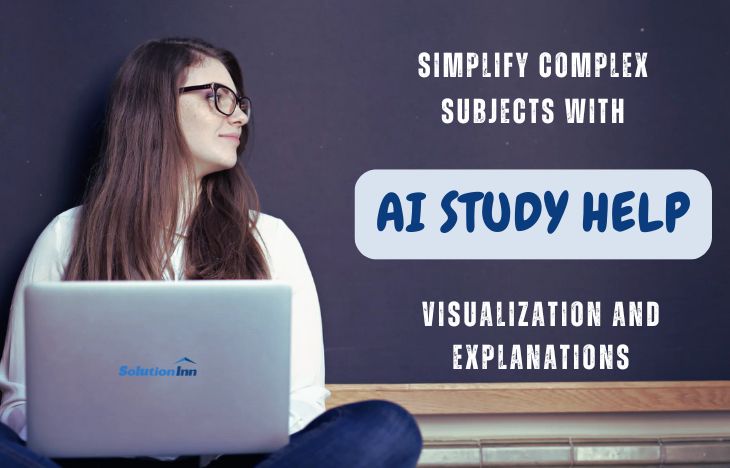Introduction to AI study help
Navigating the maze of complex subjects can be daunting for students. Whether it’s calculus, physics, or even advanced literature, these topics often feel overwhelming. Enter AI study help—a revolutionary tool that’s changing the game in education. With its ability to simplify intricate concepts through visualization and tailored explanations, AI is not just a trend; it’s becoming an essential part of effective learning strategies. Imagine having a personal tutor available 24/7 that adapts to your unique learning style! This blog post will explore how AI study help transforms challenging subjects into manageable and engaging experiences for students everywhere. Let’s dive in!
The benefits of visualizing complex subjects
Visualizing complex subjects transforms the way we learn. It turns abstract concepts into tangible images, making them easier to grasp.
When students see a graph or diagram, they can connect ideas more effectively. This connection fosters deeper understanding and retention of information. Instead of memorizing facts, learners engage with content interactively.
Visual aids cater to various learning styles too. Some people process information better through visuals than text alone. Infographics and mind maps can break down intricate topics into digestible parts.
Additionally, visualization helps identify patterns and relationships among different elements within a subject. Recognizing these connections enhances critical thinking skills.
With AI study help tools incorporating visuals seamlessly, studying becomes not just effective but also enjoyable. By embracing this approach, learners unlock their potential in ways traditional methods often overlook.
How AI can enhance studying and understanding
AI is revolutionizing the way students approach their studies. With tools that adapt to individual learning styles, AI can create personalized study plans tailored to each student’s strengths and weaknesses.
Imagine having an intelligent tutor available 24/7, ready to explain difficult concepts in a clear and engaging manner. This technology breaks down complex subjects into manageable pieces, making it easier for students to grasp challenging material.
Interactive simulations and visual aids powered by AI help visualize intricate theories. Whether it’s through dynamic graphs or animated models, these resources transform abstract ideas into tangible understanding.
Furthermore, AI can analyze past performance data to provide targeted suggestions for improvement. By identifying areas where a student struggles most, AI ensures they focus on what truly matters in their education journey. Engaging with this advanced technology makes studying not just effective but also enjoyable.
Real-life examples of how students have used AI study help to simplify complex subjects
Maria, a college sophomore, struggled with calculus. She turned to AI study help at SolutionInn and found an interactive graphing tool. It transformed her understanding of functions and derivatives by visualizing concepts she once found overwhelming.
Meanwhile, Jake was grappling with organic chemistry. The subject felt like a foreign language until he discovered an AI-powered flashcard app that highlighted molecular structures through engaging visuals. This not only boosted his memory but also ignited his interest in the topic.
Then there’s Sarah, who faced challenges in literature analysis. Using an AI study assistant, she received tailored explanations about themes and character development in classic novels. With these insights presented visually, complex narratives became easier to digest.
These stories showcase how students leverage technology to break down challenging subjects into accessible components—making learning more enjoyable and effective than ever before.
The future of AI in education and its potential impact on learning
The future of AI in education holds immense promise. With advances in machine learning and natural language processing, personalized learning experiences are on the horizon.
Imagine a classroom where each student receives tailored content based on their individual needs. AI can adapt lessons to fit varying learning paces, ensuring no one is left behind.
Moreover, intelligent tutoring systems will emerge as vital resources for students seeking help outside traditional hours. These tools can provide instant feedback and explanations, enhancing comprehension without the pressure of a deadline.
As educators embrace technology, collaboration between AI and teachers could redefine instructional methods. This partnership may allow instructors to focus more on mentorship while machines handle routine queries and assessments.
With continuous evolution in technology, educational landscapes will transform dramatically. The integration of AI promises not just to aid understanding but also to ignite curiosity among learners everywhere.
Conclusion: Embracing technology for a better learning experience
Technology has transformed the way we learn. AI study help is at the forefront of this change, providing students with tools that make complex subjects more approachable. Visualization techniques enable learners to grasp challenging concepts through engaging graphics and interactive content.
As students increasingly turn to platforms like SolutionInn for support, they find tailored explanations that resonate with their individual learning styles. This personal touch fosters a deeper understanding and retention of information.
Looking ahead, the role of AI in education will expand even further. With advancements in machine learning and data analytics, personalized educational experiences will become commonplace. The potential for AI to adapt lessons based on performance metrics opens exciting avenues for enhanced engagement.
Embracing these technological innovations can lead to significant improvements in academic success. Integrating AI study help into everyday learning not only simplifies difficult topics but also empowers students to take control of their educational journeys. As technology continues to evolve, so too does our capacity for effective learning—making it an exciting time to be a student.




